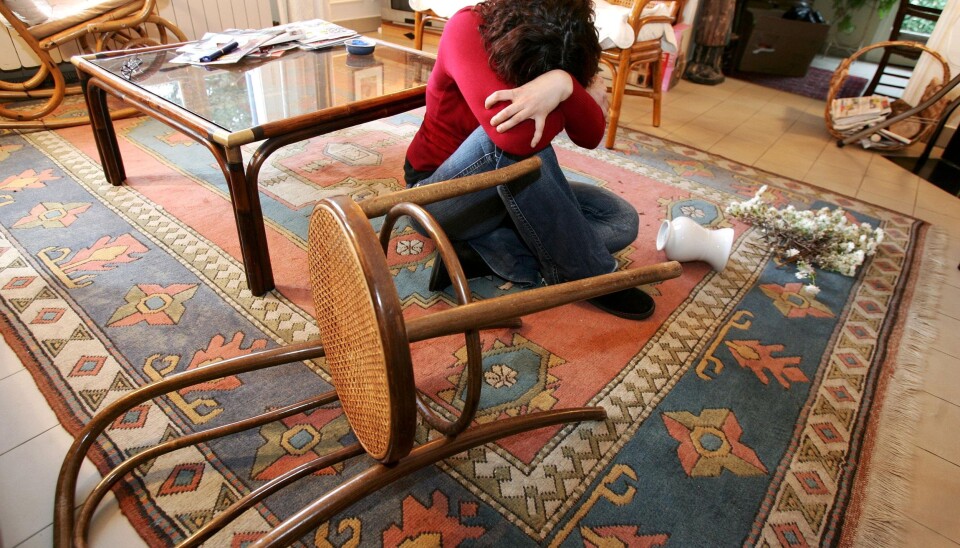An article from KILDEN Information and News About Gender Research in Norway

The stereotypical picture of intimate partner violence revised
A higher socio-economic status than one's partner increases the chance of psychological violence and abuse. This applies to both men and women.
Denne artikkelen er over ti år gammel og kan inneholde utdatert informasjon.
New research on violence and relationships does not support the stereotypical pattern of strong men in powerful positions who abuse their weaker, female partner.
“Whenever power is unevenly allocated in a relationship, the chance of physical and psychological abuse increases,” says Heidi Fischer Bjelland, sociologist and PhD student at The Norwegian Police University College.
“The abused partner is the one with the highest status,” she says.
This applies both to men and to women.

Bjelland has examined survey replies from 1,640 men and 1,791 women who live with their partners.
The participants have answered questions relating to whether they have experienced physical partner violence such as strangling and flat hand slapping, and psychological abuse such as threats of physical violence, jealous behaviour and freedom restriction.
Higher status- increased risk
Both men and women with a higher status than their partner have an increased risk of experiencing psychological abuse or controlling partners.
Additionally, women with a higher income than their partner also have an increased risk of experiencing physical abuse:
“Their risk of experiencing both physical and psychological violence increases with the difference in income,” says Bjelland.
The figures from the study shows that women earning more than 67 percent of the total household income have an almost seven times bigger risk of experiencing psychological and physical abuse – so-called double violence – from their partner compared to women who earn less than 33 percent of the total household income.
Moreover, women with considerably higher education than their partner have an increased risk of experiencing both physical and psychological abuse.
The study challenges previous research which has concluded that a high socio-economic status decreases the risk of experiencing intimate partner violence.
“My study shows that high income or education works as protection against acts of violence only as far as the income and education does not exceed that of the partner,” says Bjelland.
“There seem to be two mechanisms at play here: one relating to the individual and another to the relationship as such.”
Men experiencing psychological abuse
The study shows that men with a higher income or education than their partner have an increased risk of experiencing psychological abuse and control.
However, men do not face the same risk of experiencing physical abuse.
“Previous studies have looked primarily at physical abuse. They have also included some types of psychological violence such as control and threats of physical violence, but they have not distinguished these psychological acts of violence as a category in itself. When I distinguish between psychological and physical acts of violence, the psychological factor is becoming much clearer and the results become more nuanced,” says the researcher.
One of the finds particularly surprised Bjelland:
“The fact that men with a higher socio-economic status than their partner have an increased risk of experiencing abuse in their relationships was very surprising, since it conflicts with international studies within the same field.”
She emphasises the Norwegian gender equality as a possible explanation.
“Perhaps this indicates that, in today’s Norway, women won’t accept being without power as a result of having a lower socio-economic status than their partner.”
“On the other hand, few studies have examined men’s risk of abuse earlier, which may be an explanation as to why these finds are so new and surprising.”
According to Bjelland, previous studies of intimate partner violence have often excluded men from the data material.
“There has been a strikingly unbalanced focus on women and what consequences their experiences of intimate partner violence might have for them.”
Change the power balance
Bjelland believes the results of her study imply that intimate partner violence may be all about trying to change the power balance. The intimate partner violence is a type of contrapower strategy towards a stronger partner.
“Violence or control is used as a compensation for the partner’s weak position in the relationship, and may thus be regarded as an attempt to balance what is perceived as an uneven division of power.”
Such power strategies are in sociology often referred to as conscious tactics.
Bjelland is not convinced that these strategies are as premeditated as the theory implies.
“Perhaps the abuse in some cases has to do with an unconscious fear of losing a partner which is more attractive “on the market” due to his or her socio-economic status.”
When jealousy becomes psychological violence
The most frequent type of psychological abuse or partner violence in the survey had to do with the partner wanting to know where the other part is, with whom they are with, and when they are due back home.
The second most common type, was jealous behaviour and attempts to restrict the other part’s social interaction with friends and family.
It is not uncommon to want to know where one’s partner is and when he or she might be home; when does this become psychological violence?
“There is no clear answer to that. But this does not have to do with everyday random questions about where someone has been. When the interviewees describe their partners as being inquisitive regarding these things, it is reasonable to assume that it is a type of violation and an attempt to restrict the partner’s freedom.”
“This is a common way of identifying psychological violence in studies on intimate partner violence,” says Bjelland.


































